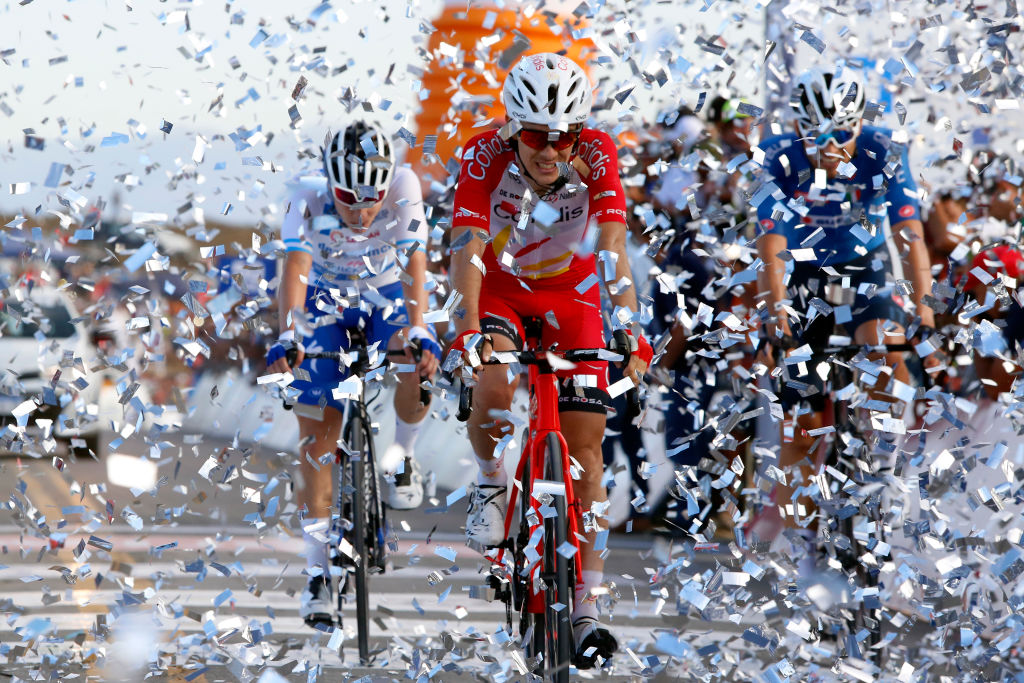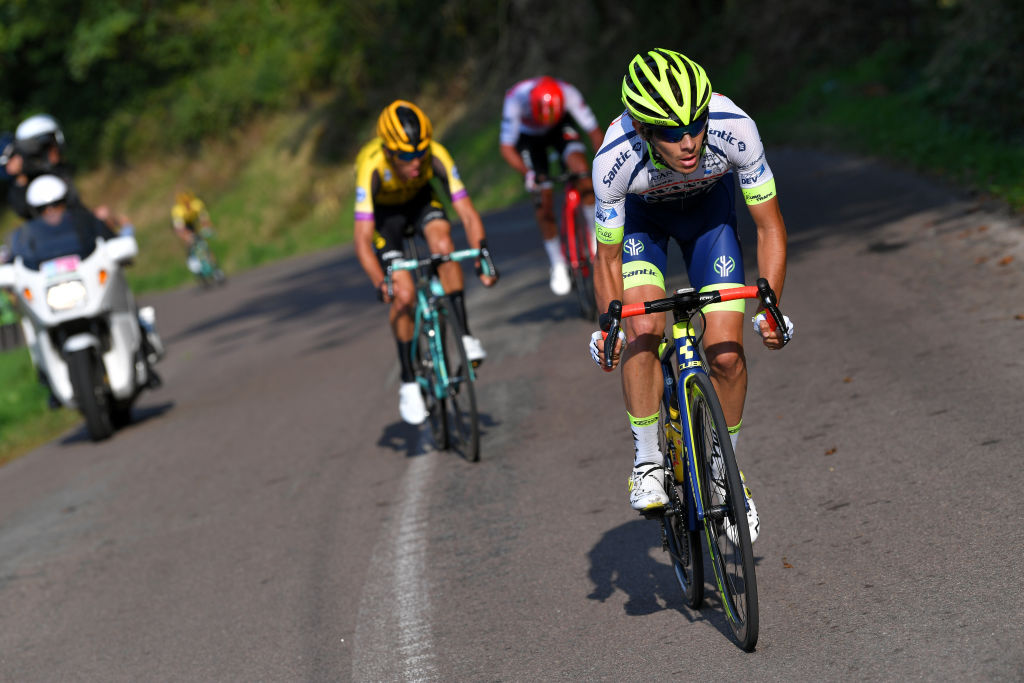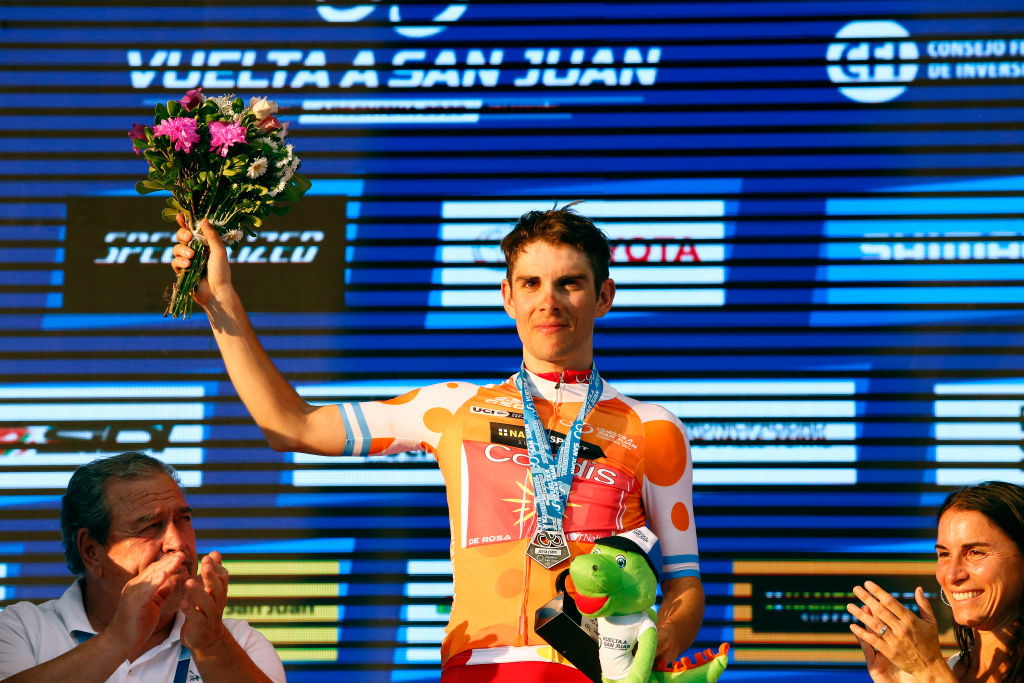Guillaume Martin: A result without emotion leaves a feeling that something is missing
French rider on writing, philosophy, moving to Cofidis and playing seriously

If lightness is a necessity for a climber and a virtue for a writer, then maybe it’s no wonder that Guillaume Martin excels in both disciplines.
Take last summer. While the sports pages noted Martin’s 12th place finish at the Tour de France, the culture sections in the French press were warmly reviewing his recently published book, Socrate à vélo (‘Socrates on a bike.’)
A philosophical volume written by a man with a penchant for Nietzsche and scaling mountains puts one in mind of the solitary, contemplative figure from Caspar David Friedrich’s painting Wanderer Above a Sea of Fog, but Martin’s text dances along in time with the quickness of his wit. Like Italo Calvino, his weighty concepts are well served by the lightness of his touch.
Socrate à vélo is liberally laced with humour, and its very premise – national teams composed of famous philosophers competing in the Tour de France – is a nod to the Monty Python Philosophers’ Football Match sketch, where Socrates and the ancient Greek philosophers take on a German squad that features, among others, Nietzsche, Karl Marx and “surprise inclusion” Franz Beckenbauer.
Martin’s playfulness is evident throughout a text that couches both cycling and philosophy as games, though he stresses that this should not be confused with a lack of seriousness. Quite the contrary. For professional riders, riding a bike, which started as a child’s game, gradually develops into an adult’s job, but Martin does not see any tension between the different stages of his cycling life.
“When you talk about a game, you have the image of something trivial, but for me, a game is very, very serious, so that means that this game, cycling, is something that I do very seriously,” Martin tells Cyclingnews.
“It’s my profession, true, but I don’t oppose ‘game’ with ‘profession.’ There wasn’t a transition between some sort of golden age, where I rode a bike just out of fondness, and now, where it has become my profession.
The latest race content, interviews, features, reviews and expert buying guides, direct to your inbox!
“On the contrary, when I started cycling, I already did it very seriously, because when I play a game – whatever it is, even a board game – I want to win and so I do it as seriously as I can. Afterwards, when you go deeper into a certain field, whatever it is, you learn to love it even more. I think I love cycling more now than when I started.”

More than a race number
As an under-23 rider, Martin combined racing with studying for a master’s degree in philosophy at Paris Nanterre University.
His final dissertation discussed modern sport as an application of Nietzschean philosophy, with an emphasis on the link between body and mind. In Socrate à vélo, Martin makes the case for the “intelligence of the body” and rebuts the idea that sportspeople are simply “living machines,” oblivious to everything but their chosen pursuit.
“Deep down,” he writes, “one forgets that the sportsperson is also a human being, whose life is not summed up by the number on their back.”
The irony is that earlier in Martin’s career, it sometimes felt as though his achievements on the bike were being overlooked, as though eclipsed by his reputation as a philosopher off it. When he made his Tour debut in 2017, for instance, television crews routinely cooped outside the Wanty-Groupe Gobert bus in search of colour, thrusting weighty tomes into the vélosophe’s hands as props, and paying scant regard to the stylish climbing displays that were carrying him to 23rd overall.
The neophyte Martin dutifully played along with the role assigned to him.
“It was true that I had a master’s degree in philosophy and I was a professional cyclist, so I didn’t exactly have to force my talent as an actor,” he deadpans.
Over time he has been more properly feted for his prowess as a rider. His steadily rising trajectory during his tenure at Wanty-Groupe Gobert saw to that.
Martin won the Giro della Toscana in 2017, the Circuit de la Sarthe in 2018 and a stage of the Giro di Sicilia last year, when he also placed 12th overall at the Tour and finished the season as the second-best French rider in the UCI standings.
This winter, the 26-year-old moved ‘home’ to Cofidis, and he will lead the newly promoted WorldTour team in July at the Tour.
“My results have evolved, and people have taken an interest in me for my sporting performances,” Martin says, though he acknowledges that his fine 2019 campaign was overshadowed by those of Julian Alaphilippe and Thibaut Pinot.
“That’s normal, they were on the point of winning the Tour de France. Also, I was on a foreign team, and a Pro Continental one at that.”
Therein lies one of the curiosities of Martin’s path to this point. The Norman was highly touted as a junior, playing a pivotal role in setting up Pierre-Henri Lecuisinier’s win at the 2011 Worlds in Copenhagen. He later joined the CC Étupes production line, where recent alumni include Thibaut Pinot, Adam Yates and Warren Barguil.
He raced as a stagiaire with FDJ in 2014, but despite winning the under 23 Liège-Bastogne-Liège and a stage of the Tour de l’Avenir the following year, Martin didn’t receive a single contract offer from a French professional team.
“I really didn’t understand what I was lacking, and I still don’t understand. I’ve never been given an explanation,” he says.
“It was really complicated to find a team. FDJ had taken me as a stagiaire but the next year, I had no news and no explanation. My first offer was the one from Wanty, and it came in October, so obviously I said yes. And in hindsight, it was the best thing that could have happened to me.”
Riding on a Belgian squad with an emphasis on the Classics granted Martin freedoms he would not have been afforded elsewhere, such as leadership at the Tour of Austria as a neo-professional, when he placed second overall. Martin returned the favour, as his élan helped Wanty earn wildcard invitations to the Tour in the next three seasons.
“It was a team that allowed me to grow while growing at the same time as me,” he says. “They were four very beautiful years.”
While Martin earned the admiration of Tour director Christian Prudhomme, he remained strangely under-appreciated elsewhere in his home country. In four years as a professional, he has never been included in the French team for the World Championships, not even on the arduous parcours in Innsbruck. He never made the cut as an espoir, either. His lone Worlds appearance remains that cameo as a junior nine years ago.
“There have been several instances where I’ve found myself at the threshold, but always on the wrong side of the door,” Martin says. “With my profile, people don’t readily place their confidence in me, but afterwards, I think I’ve shown that they can.”
Perhaps Martin’s decision to study philosophy to postgraduate level was interpreted in some quarters as a lack of dedication to the métier of the cyclist, even if a university education is hardly a rarity in the modern peloton.
“The fact I did kind of atypical studies like that marked me out, perhaps,” Martin says, though not wholly convinced. “Maybe it was just my physique and my way of being. I’m not imposing physically and I’m not very extroverted.”
Theatre while on stage at the Tour de France
It would be wrong to describe Martin as an accidental cyclist, but rather than restrict himself to one lane, he explored multiple paths as an adolescent in the Orne, where he grew up in a 16th century country house that his parents had purchased essentially as a ruin and refurbished gradually over a quarter of a century. ‘La Boderie’ now houses an aikido dojo run by his Martin’s father, Daniel, and a theatre company led by his mother, Marie.
Daniel had been a cyclist as a young man, but his son took up racing simply because it was the sport he most enjoyed as a child. The pleasure never abated, so he kept going after the junior ranks. His talent eventually carried him to the professional peloton.
“I always did it seriously, but the possibility of turning pro became a reality quite late,” he explains.
Martin adopted a similarly freeform approach to his studies. In secondary school, his teachers encouraged him to specialise in sciences for his baccalauréat, but Martin preferred the humanities. The career prospects for a philosophy graduate were nebulous at best, but Martin was studying for knowledge, not money.
“Maybe it was risky to do something like that without a real objective behind it,” he admits. “It’s turned out to be a rewarding strategy, but I don’t know if you can deduce a general law that you should just do things for pleasure.”
It’s certainly an outlook that has suited Martin, whose curriculum vitae resembles that of a Tenenbaum sibling.
He is surely the only man to ride the Tour de France while simultaneously having a play staged at France’s most prestigious arts festival. Last July, his play Platon versus Platoche was performed at the Festival d’Avignon – and directed by his mother – while he was on duty at La Grande Boucle.
“Writing for the theatre, initially at least, was a game, something for pleasure,” he says. “I didn’t really think it was going to end up being performed.”
The play depicts a Plato caught between his standing as an intellectual and his desire for action, a tension that Martin appears to have resolved in his own life. He doesn’t toggle between worlds so much as merge them, jotting off droll columns for Le Monde while preparing for the Tour.
His perspective on the Olympic ideal of Pierre de Coubertin, for instance, is informed by this dual experience. The scholar in Martin understands the context of secularised Christian values and post-revolutionary egalitarianism that informed De Coubertin’s ideal.
The athlete knows that it is worthy, but in no way a reflection of reality. Or, as Martin puts it: “When a sportsperson wins, they don't say, ‘Ah, but the most important thing was to take part.’”
Moving to Cofidis for 2020

When Martin moved to Cofidis this winter, he noted that he had signed for the team it aspired to be in 2020, and not the one it had been in the past.
“I want to participate in this adventure,” he said.
Together with sprinter Elia Viviani, he is the marquee addition to Cedric Vasseur’s revamped squad and the increased expectation that comes with being the French leader of a French team is something he welcomes.
“I was always a leader at Wanty and every year at the start of the Tour de France, I asked myself how I would manage because I had more pressure than the year before,” he says.
“The responsibility is something I like, something I seek. That’s one of the reasons why I’ve come to a French team.”
Martin’s Cofidis debut at the Vuelta a San Juan was a case in point. His team may have dispatched him to Argentina with no obligation to bring home a result, but the concept was anathema to Martin.
“I don’t like that mentality, so I was the one who said I was going to try to get a good result. I asked to have more responsibility, it’s not something that inhibits me,” he says.
He was an aggressive presence whenever the road climbed, coming close to victory atop the Alto Colorado, claiming the mountains classification and placing seventh overall.
After a training camp at Mount Etna, Martin’s campaign resumes with the Ardèche Classic next week, and his spring calendar will include Paris-Nice, the Tour of the Basque Country and the Ardennes Classics.
His early objectives are twofold – to secure the first WorldTour win of his career and to work towards the great rendezvous in July. During those methodical months of preparation and building form, Martin is largely in control of his own narrative, but when he lines up for the Grand Départ in Nice on June 27, he will be performing in a play where the script is unwritten.
"For the Tour, there’s the preparation phase, where you can control and measure everything. You just do your best to be in better condition than the previous year,” Martins says. “And then there’s the race phase, which is a great madness. Anything can happen, and I like that too.”
That madness is a great part of the attraction. Participating in the event, he says, is akin to getting caught up in a whirlwind.
"In a sense, there’s less pressure at the Tour, because you don’t have time to feel pressure," Martin says.
Vasseur believes Martin can place in the top five in Paris, but the cyclist himself knows that he could ride much better than in 2019 and yet fall short of matching his placing of 12th. Such are the terms of engagement. Whatever about the final outcome, Martin longs for a Tour as a protagonist, as an actor who leaves his mark on the stage.
“A result without emotion leaves a feeling that something is missing,” Martin says.
“Last year, I was 12th in the Tour, but there wasn’t any little seed of madness. I was consistent every day, but there was never a grand gesture. People weren’t interested in me anymore. It was a Tour where I was satisfied with the work done, but I came away with a slight feeling that something was missing.”
Martin will look to rectify that in July. A game played this seriously isn't about taking part; it's about taking pleasure.

Barry Ryan was Head of Features at Cyclingnews. He has covered professional cycling since 2010, reporting from the Tour de France, Giro d’Italia and events from Argentina to Japan. His writing has appeared in The Independent, Procycling and Cycling Plus. He is the author of The Ascent: Sean Kelly, Stephen Roche and the Rise of Irish Cycling’s Golden Generation, published by Gill Books.